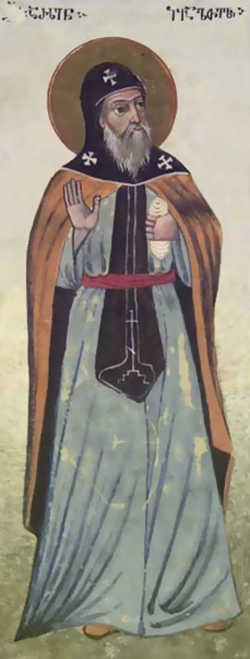Arsen of Ikalto

Arsen of Ikalto (1050s - near 1130s) was a churchman and cultural figure, writer, translator, scientist, philosopher. He is sometimes referred to as Vachesdze (Vache's son) in the sources. Arsen of Ikalto must be Arsen Kaliposeli (academician K. Kekelidze does not share this point of view). There is also an opinion that Arsen of Ikalto is the same person as Arsen Beri (the Monk Arsen) (David the Rector, P. Ioseliani, A. Khakhanashvili, M. Janashvili, Z. Chichinadze, P. Ingorokva, I. Lolashvili, E. Gabidzashvili). Some researchers consider Arsen Beri to be the author of the history of David IV the Builder, which eliminates the possibility of him being Arsen of Ikalto (S. Kakabadze, K. Kekelidze, K. Grigolia, J. Odisheli).
There are very few references to the biography of Arsen of Ikalto preserved in his inscriptions and in the writings of authors of those and later times. He was born in Kakheti, in the village of Ikalto (hence his nickname), and was ordained as a monk in a monastery there. Evidently, he received his education in the theological academy founded by the Byzantine emperor Constantine Monomachos near the Monastery of St. George of Mangana in Constantinople; Michael Psellos and John Italus, representatives of the Byzantine Renaissance, worked in the academy. Only there could Arsen of Ikalto share the advanced ideas and theological–philosophical views that his literary heritage is imbued with. From Mangana, he went to the Black Mountain (Syria), to the monasteries of Simeon of Verkhoturye and Kalipos, where he began his literary activities under the guidance of Ephrem Mtsire. It is likely that after the death of Ephrem Mtsire (end of 11th century) Arsen of Ikalto went back to the Monastery of St. George of Mangana. In the beginning of the 12th century, Arsen of Ikalto came to Georgia (probably invited by David IV), he actively participated in the work of Ruisi-Urbnisi Council in 1104, he was one of the founders of the Gelati Academy, where he was involved in pedagogic activities. Then he settled in the Shio-Mgvime monastery and contributed to the flourishing of the Georgian literacy there. According to traditional narration, he founded the Academy of Ikalto, where he was most likely buried. Contemporaries of Arsen of Ikalto call him the “enlightener of all churches” for his educational and scientific achievements (historian of Davit IV).
The works selected for translation by Arsen of Ikalto confirm that he took from philosophy only what was useful for Christian dogmatics, namely, the Doctrine of Justification. This led to his special interest in the teachings of Aristotle, as well as his translation of the Source of Knowledge by John of Damascus without the parts where philosophy is presented in the form of a worldview.
Some of the works translated by Arsen of Ikalto from Greek had a landmark value in the history of Georgian literature, among them: The Great Canon of Faith — a translation of the main canonical code of the Orthodox Christian Church — Nomocanon (883); Dogmatikon — a collection of selected polemical writings laid the foundation for the development of dogmatic–philosophical thought in Georgia; The Chronicle by George Hamartolos; hymnographic–liturgical work The Great Canon or The Great Canon of Repentance by Andrew of Crete, which influenced David IV to write Hymns of Repentance. Arsen of Ikalto also translated several Greek hagiographic works.
In case the opinion about Arsen of Ikalto and Arsen Beri being the same person is correct, then we should attribute to him all the original works some researchers consider to be written by Arsen Beri.
The polemical essay included in Dogmatikon and the epitaph on Davit IVs grave are also attributed to Arsen of Ikalto. Only a small part of Arsen of Ikalto's literary legacy has been published.
Edition: დიდი სჯულისკანონი. გამოსაცემად მოამზადეს ე. გაბიძაშვილმა, ე. გიუნაშვილმა, მ. დოლაქიძემ, გ. ნინუამ, თბ., 1975.
Literature: გაბიძაშვილი ე., რუის-ურბნისის კრების ძეგლისწერა, თბ., 1978; კეკელიძე კ., ქართული ლიტერატურის ისტორია, ტ. 1, თბ., 1960; ლოლაშვილი ი., მეტაფრასული „ნინოს ცხოვრების“ ავტორის ვინაობისათვის, «მაცნე». ენისა და ლიტერატურის სერია, 1974, № 4; მისივე, არსენ იყალთოელი, თბ., 1978; ნუცუბიძე შ., ქართული ფილოსოფიის ისტორია, ტ. 2, თბ., 1958.
E. Gabidzashvili


